» Go to news main
Women step into more senior leadership roles at Dalhousie Medical School
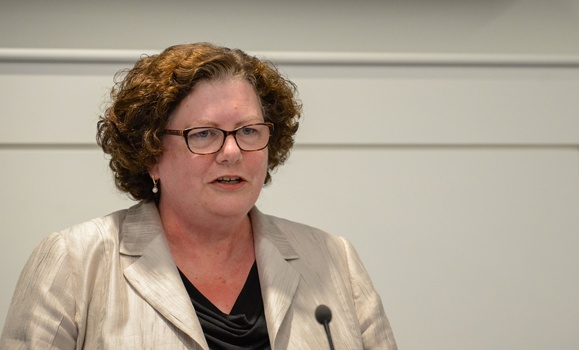
At least eight women have recently been appointed to senior positions of influence in the Faculty of Medicine, and a report on diversity in leadership has issued 28 recommendations that could add to that number.
The Diversity in Leadership initiative started in January 2017, when dean of medicine, Dr. David Anderson, struck a nine-member task force to examine representation of diverse groups in leadership roles and consider what policies and practices could be changed to enhance diversity.
“The Diversity in Leadership report provides a roadmap to greater diversity, first by showing us where we are, and then by providing directions for the future,” notes Dr. Anderson. “We are very pleased with progress in terms of the growing numbers of women in leadership roles and are developing new recruitment, retention, training and other strategies to increase representation of other groups on our leadership team.”
As Dalhousie Medical School marks its 150th anniversary in 2018, the goal is to diversify the voices who train new doctors and scientists.
The new appointments of women in senior roles include the medical school’s first-ever chief operating officer, two assistant deans (graduate studies and resident affairs), three academic department heads, an interim department head, and the leader of the medical school’s initiative to roll out the competency based medical education model in its residency training programs.
The dean highlights the considerable talents of the women appointed to leadership roles in the Faculty of Medicine over the past number of months. “The women we have recently welcomed to our leadership team are distinguished clinicians, scientists, educators and administrators, second to none in their abilities,” Dr. Anderson says. “They bring great knowledge, experience and skill to their roles.”
In fact, these women join an existing cadre of females in senior roles at the medical school—9 of 19 associate and assistant deans are women.
A history of women in medicine
Dalhousie Medical School has a long history of encouraging women in medicine. In 1881, at a time when most medical schools were refusing entry to women, the medical school’s leaders spontaneously voted to encourage women to pursue careers in medicine—even though no women had as yet applied. The first woman to graduate from Dalhousie with a medical degree was Dr. Annie Hamilton, in 1894—she was one of few in the school’s early history.
Many women have played senior roles on the medical school’s leadership team in recent decades. Some of the outstanding examples include Dr. (Sister) Nuala Kenny, who headed the Department of Pediatrics and founded and led the Department of Bioethics; Dr. Karen Mann, who was internationally known for her contributions to medical education in her longstanding role as associate dean of undergraduate medical education; and Dr. Noni MacDonald, who was the first woman in Canada to become a dean of medicine (1999 to 2004) and continues to show international leadership in the fields of global health and infectious diseases.
Like the many women who followed her footsteps into Dalhousie Medical School, Dr. Annie Hamilton was a woman of strong convictions. She cycled the streets of north end Halifax on her rounds, expounding the merits of women’s rights and the perils of tobacco and alcohol. She took her missionary zeal overseas several years later, working with abused women and children in Shanghai until her death in 1941.
Dr. Hamilton never married or had children—so she didn’t have to juggle the demands of family with her medical career. It’s a whole different ballgame for today’s generation of women doctors and scientists.
The ongoing challenge
Dr. Jean Marshall, former head of the Department of Microbiology & Immunology—and the first female head of a basic science department at the medical school—was an obvious choice to co-lead the Diversity in Leadership task force with Shawna O’Hearn, who leads several other social accountability initiatives for the medical school. “People would come to me to talk about career advancement,” she notes, “and I’ve raised the issue of the need for more women in leadership roles on a number of occasions.”
In 2005, when Dr. Marshall was appointed head of the Department of Microbiology & Immunology, she remembers being the only woman “basic science head” among more than two dozen men. She admits her appointment was not widely accepted and is grateful to Dr. Harold Cook, who was dean at the time, for his enthusiastic support.
But she ran the risk of missing important decisions because department head meetings were typically held late in the day, from 5 to 6:30 p.m., when most working mothers are feeling the pull to get home and deal with family responsibilities. Dr. Marshall says she had a supportive husband (a physician and scientist himself), but the men in the room did not seem to realize this was even an issue.
“It was not malicious,” she adds. “They were simply not thinking about the needs of working women with families.”
Meanwhile, she feels that young women who might have been on the path to leadership shied away from opportunities because there were so few female mentors to guide them. Dr. Marshall acknowledges that mentorship and confidence go hand in hand. Her own mentors were men, and she doesn’t complain about that. But she has mixed feelings when women come to her for a career review and the topic turns to childcare issues, knowing they have a sympathetic ear.
Women typically account for more than half the student population at Dalhousie University, including in the MD and graduate (MSc, PhD) programs at the medical school. But the number of women drops off dramatically at the postdoctoral and post-residency level, perhaps because these are childbearing years and difficult questions about work-life balance become more important.
“Women in that age range often become less engaged in the academic hierarchy as they take on other life responsibilities,” Dr. Marshall says, “so we lose a lot of women who might become assistant professors.”
Dr. Marshall says there is very little maternity support for some postdocs (or post-residency fellows), and it’s a very competitive time in a scientist’s career when it comes to securing research money. Grant-supported jobs are simply not practical for women starting a family, who need long-term security and childcare options.
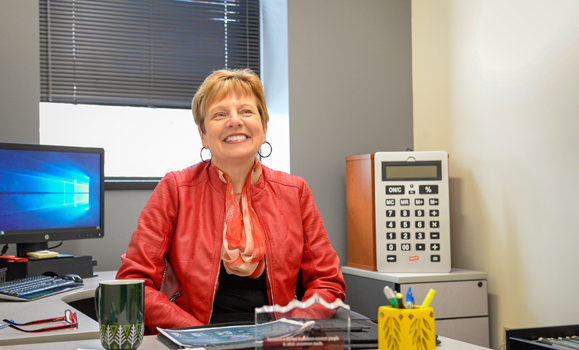
Linda Penny is Dalhousie Medical School's first-ever chief operating officer (Jollymore photo)
The Diversity in Leadership Task Force is conducting focus groups and interviews to explore the barriers and enablers to women in science, medicine and leadership, as well as the “leadership culture” of the medical school. As its report notes, diversity can also encompass the leadership style of individuals. Encouraging more diverse approaches to leadership and broadening this definition could inspire people who don’t see themselves as leaders to take a second look.
How else will the Diversity report help put more women into positions of influence at the medical school? In addition to shedding more light on the current culture, the task force suggests that the medical school foster mentoring positions and launch new strategies for recruiting and retaining diverse candidates, among 28 recommendations in the task force report. (Read the report online.)
Of course, diversity means more than gender equity. Jean Marshall regrets that the data for the numbers of members of visible minority, disabled and other designated groups was simply too limited to include in this report. But that may soon change. The social, political and legal landscape is shifting daily. Dalhousie welcomes students from all over the world, and many want to stay in Nova Scotia. Disabled people have made their voices loud and clear about their rights and needs.
Dr. Marshall is adamant that diversity leads to innovation.
“In science we work as a team,” she explains. “The more viewpoints you have, the more likely you are to come up with a creative solution. If you’re excluding major societal groups, you are limiting your collaborative opportunities and your potential for impact.”
Women in leadership
These eight women all accepted senior leadership roles at Dalhousie Medical School in the past year. Outstanding role models that they are, they share their insights and wisdom about succeeding in a challenging field.
 DR. CAROLYN THOMSON, Assistant Dean, Resident Affairs, July 2017
DR. CAROLYN THOMSON, Assistant Dean, Resident Affairs, July 2017
“Remember, you can ‘do it all’ but you can’t do it all at once!”
Dr. Thomson is a long-time family physician who has worked in emergency medicine, obstetrics and primary care. In addition to being Dalhousie Medical School’s first associate dean of resident affairs—responsible for resident wellness programs and supports—she is a faculty member with the Department of Family Medicine. Her interest in physician health started 15 years ago, when she was coordinating professional support programs for Doctors Nova Scotia. “I realized that the rigours and complexity of the medical environment were taking a significant toll on physician’s health and wellness. High levels of burnout, stress-related illnesses and depression were seen in physicians whose main priority was providing a high standard of care to their patients.” Residents and medical students experience similar challenges, she says, adding that stigma often prevents physicians and trainees from seeking the help they need in a timely manner. “My goal is to provide safe, confidential help and support to those who are struggling.”
She credits Dr. Michael Kaufmann, founder of the physician health program in Ontario, for encouraging her to explore this new field of research. Her advice to other women trying to work their way into positions of influence in science or medicine? “Discover what you are passionate about and get involved. Find a mentor or mentors!”
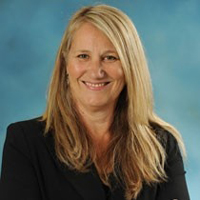 DR. SUSAN KIRKLAND: Interim Head, Department of Community Health & Epidemiology, September 2017
DR. SUSAN KIRKLAND: Interim Head, Department of Community Health & Epidemiology, September 2017
“There are often multiple paths to get to the same destination. Not all of them are direct. Follow your passion. It’s like taking the scenic route.”
If you’re on the other side of 60, or have parents in that demographic, you can look to Dr. Kirkland for understanding. An epidemiologist who came to Dalhousie in 1992 from the University of Toronto, she has dedicated her career to unravelling the mysteries of the aging process. “I had always been interested in my own health, and it just expanded from there. I love the notion of ‘Saving Lives, Millions at a Time.’” Her research spans many aspects of aging, including cardiovascular disease, osteoporosis, frailty and cognitive impairment. She is one of three principal investigators leading the Canadian Longitudinal Study on Aging, a 20-year study of 50,000 Canadians.
Dr. Kirkland credits another Dalhousie achiever—Dr. Jean Gray, professor emeritus of medical education, medicine and pharmacology—for providing the encouragement she needed to rise through the scientific and academic ranks. “Her support was steadfast. When the notice of my appointment was released, the very first congratulatory email I got was from Jean.”
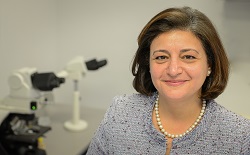
DR. IRENE SADEK, Head, Department of Pathology, September 2017
“The nurturing attitude of women enriches the work environment as much as it does within the family.”
Growing up in Egypt, family was a powerful force in Dr. Sadek’s life and career. She describes her parents as loving and supportive role models and says that they and her close-knit extended family were “instrumental in shaping my social interactions.” On the other hand, “Attending a Catholic nun’s school ingrained in me discipline, perseverance.”
Dr. Sadek became interested in hematopathology (blood disease) while studying medicine in Cairo. She came to Dalhousie for her residency training, and then did a fellowship in stem cells at the University of Nebraska. Under her supervision since 2003, the Division of Hematopathology has flourished to become one of Canada’s leading hematopathology groups. Advice to young women working up through the ranks? “Face each obstacle with a positive and a can-do attitude. Make sure to look after your personal and family life.”
 DR. CHRISTINE SHORT, Head, Department of Medicine, September 2017
DR. CHRISTINE SHORT, Head, Department of Medicine, September 2017
“People are always looking for modern-day heroes… as a specialist in physical medicine and rehabilitation… I always say the heroes in my life are my patients.”*
Dr. Short comes to this appointment from the Division of Physical Medicine & Rehabilitation, where she was Division Chief since 2011. Her interest in rehabilitative medicine developed in 1992, when she was in medical school working as a summer student at the Nova Scotia Rehabilitation Centre. She has dedicated years to learning how to alleviate spasticity and pain and improve mobility and function in patients with spinal cord injuries and diseases like multiple sclerosis. Community involvement is also important to Dr. Short, who among many roles has served on the board of directors of the Canadian Paraplegic Association and Wanderer’s Trust Scholarship Committee for the Disabled. She brings great leadership, clinical, research and teaching abilities to her new role in the Department of Medicine.
*Saltscapes magazine, February-March 2018
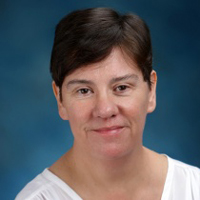 DR. ELIZABETH COWLEY, Head, Physiology & Biophysics, November 2017
DR. ELIZABETH COWLEY, Head, Physiology & Biophysics, November 2017
“Women make up 50 per cent of the population, so it seems reasonable to expect that we will make up 50 per cent of everything—including senior roles in the medical school.”
Dr. Cowley came to Dalhousie in 1993 with degrees in pharmacology (University College London) and anatomy (PhD, University of Leicester). She teaches respiratory physiology and pathophysiology and pursues an active research program in lung disease—especially cystic fibrosis. Advice to other women in science and medicine? “Men will often talk over you or trivialize your concerns. Women bring compassion and a different way of thinking about issues to the table. Always be polite and kind, but firm in getting your point across!”
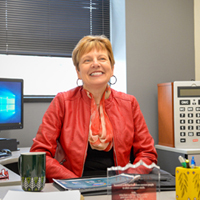 LINDA PENNY, Chief Operating Officer, Faculty of Medicine, January 2018
LINDA PENNY, Chief Operating Officer, Faculty of Medicine, January 2018
“Go over and above what your ‘job description’ tells you and make sure you enjoy what you are doing!”
Linda Penny’s trajectory to become the first COO of the medical school reads like a finely-executed plan few others could emulate. She comes to the role after several years as Dalhousie University’s director of budgets and financial analysis but, before that, she worked in leadership roles with Nova Scotia’s Department of Health and Wellness. Over the years, she oversaw strategic planning and financial management for hospital services, infrastructure, long term care, primary care, physician services, emergency health services, public health and mental health services. And, yes, she’s a certified public accountant.
She credits her success to mentors who encouraged her to grab every opportunity and offers the same advice to other women. “Find the area that is of real interest to you and look for any opportunity to be involved in projects and initiatives that provide you with experience and knowledge in that area. Make sure you also obtain the educational background necessary for the job, even if it takes years to complete. When you look back you will be glad you did it!”
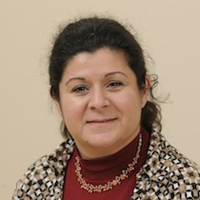 DR. VALERIE CHAPPE, Assistant Dean, Graduate and Postdoctoral Studies, January 2018
DR. VALERIE CHAPPE, Assistant Dean, Graduate and Postdoctoral Studies, January 2018
“Never give up on your dreams and aspirations. Don't let anyone convince you that you cannot accomplish your goals and, most importantly, believe in yourself.”
A well-funded cystic fibrosis researcher and enthusiastic teacher at the undergraduate and graduate levels, Dr. Chappe has always been enthralled and stimulated by the University environment, “for the breadth of activities … and so many inspiring people,” she says. “Working with trainees is very motivating, refreshing and certainly far from routine tasks. It is very rewarding and enjoyable to see them grow into skilled professionals. They drive us to constantly rethink and refine our own skills and develop the very best research and training environment.”
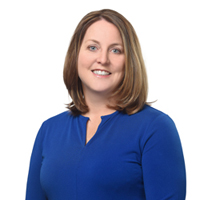 DR. JANICE CHISHOLM, Competency-Based Medical Education (CBME) lead, February 2018
DR. JANICE CHISHOLM, Competency-Based Medical Education (CBME) lead, February 2018
“Being a woman in a leadership role does not mean you have to be strong and tough all the time. You can just be you—common sense, compassion and doing the right thing go a long way.”
Dr. Chisholm grew up in a small rural community, where volunteering was an everyday activity, whether at the hospital, teaching swimming, or serving dinners at a community supper. “Wanting to help others is what led me to medicine,” says Dr. Chisholm, who is both an anesthetist and critical care specialist. Finding anesthesia was a twist of fate, she claims, but a nurturing spirit drew her into critical care, where helping patients and families with end-of-life decisions is an important part of her job. Education has been a lifelong calling, and led to teaching at the medical school, the role of anesthesia residency program director and, now, CBME lead. Among Dr. Chisholm’s mentors, she thanks the “Chicks in Anesthesia” who helped her realize “a gender divide doesn’t mean I can’t be successful in my own life—it just may be in a different way.”
Diversity in Leadership Task Force
Jean Marshall, PhD (Professor, Microbiology and Immunology)
Shawna O’Hearn, MA, MSc (OT) (Director, Global Health Office)
Roger McLeod, PhD (Associate Dean Research, Faculty of Medicine)
Constance LeBlanc, MD (Associate Dean, Continuing Professional Development)
Arigal Shaibah, PhD (Vice-Provost, Student Affairs)
Janice Godin (Director, Human Resources)
Thomas Pulinilkunnil, PhD (Assistant Professor, Biochemistry & Molecular Biology)
Christy Simpson, PhD (Department Head, Bioethics)
Anthony Armson, MD (Department Head, Obstetrics & Gynecology)
Recent News
- Dalhousie’s first physician assistant cohort steps into Nova Scotia’s healthcare system
- Dalhousie med students explore pediatric care in Austria
- Dalhousie researchers shine at Discovery Awards with four top honours
- New $2M national study to uncover how biology, social factors shape MS outcomes
- Pathology EDIA Committee makes strides during 2024‑2025 year
- CCfV’s impact on vaccine innovation
- Unlocking the secrets of memory—with fruit flies
- Celebrating mobility research and the power of philanthropy
